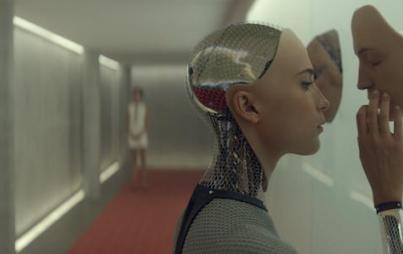
Image: Flickr
How do you stop an authoritarian dictator like President Snow — who bleeds from his lips and is something of an evil vampire himself — without violence?
Early on in The Hunger Games: Mockingjay, Part 2, Gale, (Katniss Everdeen's longtime hunting companion and sort of love interest) describes a vicious trap he's designed for the rebellion against the evil President Snow. A bomb will detonate. Then, after a pause in which medical personnel and others rush to the aid of the wounded, a second blast will go off.
Katniss is understandably horrified at a weapon explicitly designed to kill civilians. "I guess there isn't a rule book for what might be unacceptable to do to another human being," she says. Gale, though, is unabashed. In war, he says, there are no rules.
Katniss is the conscience of and voice of morality in the film, and in the Hunger Games series as a whole. In the just-released last film in the series, she tries repeatedly to avoid unnecessary deaths. She insists that refugees from an attacked base be given an escape route, for example, and exposes herself in an effort to help them.
And then one of them shoots her for her troubles.
That's par for the course in The Hunger Games. Katniss wants to reduce harm and avoid violence, but she can't. In the first film, in which she is sent into an arena with other children and teens for the entertainment of Capitol citizens and their gory reality-television pleasure, she doesn't want to murder, but she has to. In the second film, when she is forced to return to the games, she just wants to escape — not touch off a revolution. But when she destroys the arena, it triggers rebellion, war, and large-scale violence and death. In the final film, she insists she is "done being a piece in [Snow's] game." But she ends up killing a defenseless opponent in cold blood in line with the plans of another manipulator, the former game designer Plutarch. Democracy is achieved at the film's end — not through a vote, but through a final political assassination.
Nonviolence in The Hunger Games series is not an option. Katniss has to kill: first to save her life in the arena, and then to bring about the end of a brutally authoritarian dictatorship. As in most action series, violence is inevitable.
There are a couple exceptions, though. In the Twilight series — a YA phenomenon often compared unfavorably to The Hunger Games — Bella, and her vampire friends, are frequently able to avoid battle or murder. The vampiric Cullen family are defined, in the first place, by their refusal to kill humans — they hunt animals for blood. And that refusal to kill organizes the rest of the series as well. In the first book, when Bella is almost assaulted by a gang of toughs, Edward rescues her, but does not avenge her — he doesn't rush off to kill, or even maim, the bad guys, choosing instead to let them go. The conclusion of the series, too, is resolved nonviolently. The massive climactic battle with the evil vampires almost happens, but then both sides back down. Instead of violence, there's a détente.
You could argue (and many have) that The Hunger Games is more realistic, or even more moral, than Twilight. After all, Twilight allows its evil vampires to go free, and since they're evil vampires, that means they'll continue to kill. How do you stop an authoritarian dictator like President Snow — who bleeds from his lips and is something of an evil vampire himself — without violence?
Snow sends children to their death, and will keep doing so until overthrown. There really is no nonviolent option: You let violence continue, or you use violence to stop it. That's why Katniss' captured ally and love interest Peeta is seen as a traitor when he is forced to plead with the rebels to stand down. Peace, to paraphrase Orwell, is in this case pro-fascist.
Pacifism is often criticized as unrealistic, and as abetting tyranny. But after all, The Hunger Games is not actually real. The violence is fictional and staged. The narrative sets Katniss up to commit violence for the same reason The Hunger Games tournament sets her up to commit violence: because violence is exciting and moving and dramatic. There is no way to negotiate with President Snow. But that's because the fictional world is set up so there's no way to negotiate with President Snow. The revolutionary violence is justified. But that's because the series is organized so that the war against the Capitol is of relatively brief duration, is completely successful, and ends (after political assassination) with a democracy. Regime change in Iraq, as one example, didn't go quite that well.
The Hunger Games series, and Mockingjay, Part 2 in particular, show war and violence as traumatic and horrible. But they have trouble imagining any alternative to that trauma and horror. Katniss is trapped not because the world is this way, or must be this way, but because a particular narrative traps her, as narratives of violence often trap individuals and nations. There is no escape from The Hunger Games when The Hunger Games is the only show on the screen.





